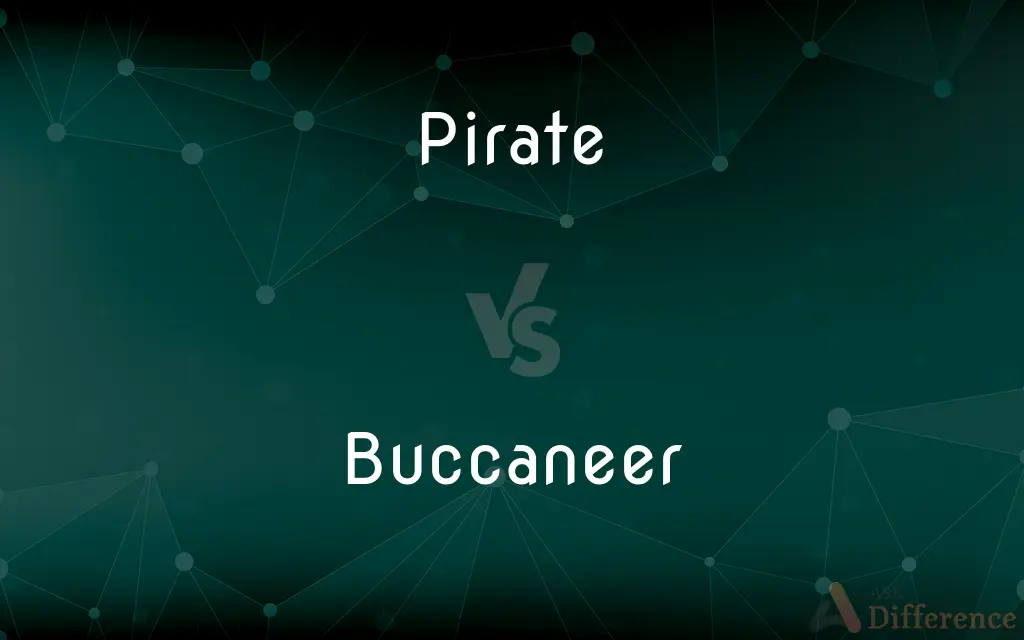Pirate vs. Buccaneer — What's the Difference?
Edited by Tayyaba Rehman — By Urooj Arif — Updated on April 9, 2024
Pirates are criminals who attack ships at sea, while Buccaneers were specific pirates from the 17th century, targeting Spanish ships and settlements in the Caribbean.

Difference Between Pirate and Buccaneer
Table of Contents
ADVERTISEMENT
Key Differences
Pirates are broadly defined as individuals engaging in acts of robbery and violence at sea. Their history spans across various oceans and eras, with motives ranging from personal gain to destabilizing trade routes. Buccaneers, however, were a distinct group of pirates active in the late 17th century in the Caribbean, originally hunters on Hispaniola and Tortuga before turning to piracy, primarily targeting Spanish ships and settlements.
While all buccaneers can be considered pirates, not all pirates are buccaneers. Buccaneers were part of a specific historical context, driven by European colonial conflicts and the pursuit of wealth in the New World. Pirates, on the other hand, operate in various maritime contexts, from ancient times to modern-day Somalia and Southeast Asia, with different motivations and methods.
Buccaneers were known for their role in the European powers’ struggles in the Caribbean, often operating with the tacit or explicit support of England and France against Spain. Their actions were part of broader geopolitical maneuvers, whereas piracy typically transcends political alignments, with pirates operating independently of state interests.
The term "buccaneer" originates from the French word "boucanier," referring to the hunters who smoked meat on a wooden frame called a "boucan." This practice was adopted by these adventurers as they transitioned from hunting to piracy. In contrast, the term "pirate" has a more general origin, stemming from the Latin "pirata," meaning "sea robber."
Both pirates and buccaneers have left a significant mark on history and popular culture, inspiring countless tales of adventure and treachery. However, the specific historical context and activities of buccaneers set them apart from the broader category of pirates, reflecting the diverse and complex nature of maritime piracy.
ADVERTISEMENT
Comparison Chart
Definition
Individuals who engage in robbery and violence at sea.
Pirates from the 17th century, targeting Spanish possessions.
Era
Ancient times to modern day.
Late 17th century.
Geographic Focus
Global, varying regions.
Caribbean, specifically against Spanish.
Motivation
Personal gain, destabilizing trade.
Part of European colonial conflicts, personal gain.
Origin of Term
Latin "pirata," meaning sea robber.
French "boucanier," hunters who smoked meat on a "boucan."
Compare with Definitions
Pirate
Operates globally, affecting international waters.
Modern pirates have adapted to use speedboats and sophisticated weapons.
Buccaneer
Known for their lawlessness and pursuit of wealth.
The buccaneers established a reputation for bravery and cruelty in equal measure.
Pirate
Part of various historical and modern contexts.
Pirates have been romanticized in literature and film, despite their criminal activities.
Buccaneer
A pirate, especially one who preyed on ships during the 17th century in the Caribbean.
Buccaneers attacked Spanish galleons laden with gold from the New World.
Pirate
A person who attacks and robs ships at sea.
The pirate ship loomed on the horizon, striking fear into the hearts of the crew.
Buccaneer
Originated as hunters on Hispaniola and Tortuga.
The buccaneers initially hunted wild cattle and sold the hides.
Pirate
Someone engaging in unauthorized warfare at sea.
Pirates in the South China Sea have become a significant concern for international trade.
Buccaneer
Involved in geopolitical conflicts, often supported by England and France against Spain.
Buccaneers sometimes acted under letters of marque, making them privateers against Spain.
Pirate
Motivated by wealth, ransom, and destabilizing commerce.
Pirates often demand ransom for the release of captured vessels and their crew.
Buccaneer
Specific to the Caribbean and the age of sail.
The golden age of buccaneers was a key part of the larger era of piracy in the Caribbean.
Pirate
One who commits or practices piracy at sea.
Buccaneer
Buccaneers were a kind of privateers or free sailors peculiar to the Caribbean Sea during the 17th and 18th centuries. First established on northern Hispaniola as early as 1625, their heyday was from the Restoration in 1660 until about 1688, during a time when governments were not strong enough and did not consistently attempt to suppress them.Originally the name applied to the landless hunters of wild boars and cattle in the largely uninhabited areas of Tortuga and Hispaniola.
Pirate
One who makes use of or reproduces the work of another without authorization.
Buccaneer
A pirate, especially one of the freebooters who plundered Spanish shipping in the West Indies during the 17th century.
Pirate
One who illegally intercepts or uses radio or television signals, especially one who operates an illegal television or radio station.
Buccaneer
A ruthless speculator or adventurer.
Pirate
To attack and rob (a ship at sea).
Buccaneer
To plunder shipping; act as a buccaneer.
Pirate
To take (something) by piracy.
Buccaneer
To show boldness and enterprise, as in business, often in a reckless or unscrupulous way.
Pirate
To make use of or reproduce (another's work) without authorization.
Buccaneer
(nautical) Any of a group of seamen who cruised on their own account on the Spanish Main and in the Pacific in the 17th century, who were similar to pirates but did not prey on ships of their own nation.
Pirate
To act as a pirate; practice piracy.
Buccaneer
A pirate.
Pirate
A criminal who plunders at sea; commonly attacking merchant vessels, though often pillaging port towns.
You should be cautious due to the Somali pirates.
Buccaneer
To engage in piracy against any but one's own nation's ships.
Pirate
An armed ship or vessel that sails for the purpose of plundering other vessels.
Buccaneer
A robber upon the sea; a pirate; - a term applied especially to the piratical adventurers who made depredations on the Spaniards in America in the 17th and 18th centuries.
Pirate
(by extension) One who breaks intellectual property laws by reproducing protected works without permission.
Buccaneer
To act the part of a buccaneer; to live as a piratical adventurer or sea robber.
Pirate
(ornithology) A bird which practises kleptoparasitism.
Buccaneer
Someone who robs at sea or plunders the land from the sea without having a commission from any sovereign nation
Pirate
A kind of marble in children's games.
Buccaneer
Live like a buccaneer
Pirate
(transitive) To appropriate by piracy; to plunder at sea.
They pirated the tanker and sailed to a port where they could sell the ship and cargo.
Pirate
To create and/or sell an unauthorized copy of.
Pirate
To knowingly obtain an unauthorized copy of.
Not willing to pay full price for the computer game, Heidi pirated a copy.
Pirate
(intransitive) To engage in piracy.
He pirated in the Atlantic for years before becoming a privateer for the Queen.
Pirate
To entice an employee to switch from a competing company to one's own.
Pirate
Illegally imitated or reproduced, said of a trademarked product or copyrighted work, or of the counterfeit itself.
Pirate
A robber on the high seas; one who by open violence takes the property of another on the high seas; especially, one who makes it his business to cruise for robbery or plunder; a freebooter on the seas; also, one who steals in a harbor.
Pirate
An armed ship or vessel which sails without a legal commission, for the purpose of plundering other vessels on the high seas.
Pirate
One who infringes the law of copyright, or publishes the work of an author without permission.
Pirate
To play the pirate; to practice robbery on the high seas.
Pirate
To publish, as books or writings, without the permission of the author.
They advertised they would pirate his edition.
Pirate
Someone who uses another person's words or ideas as if they were his own
Pirate
Someone who robs at sea or plunders the land from the sea without having a commission from any sovereign nation
Pirate
A ship manned by pirates
Pirate
Copy illegally; of published material
Pirate
Take arbitrarily or by force;
The Cubans commandeered the plane and flew it to Miami
Common Curiosities
Can a pirate operate in any sea?
Yes, pirates have operated and can operate in any of the world's seas or oceans.
Are modern pirates similar to historical pirates?
While the basic premise of attacking ships for gain remains, modern pirates use more advanced technology and operate under different circumstances.
What defines a pirate?
A pirate is someone who engages in maritime robbery and violence without authorization from any nation.
Who were the buccaneers?
Buccaneers were 17th-century pirates in the Caribbean, initially hunters before targeting Spanish ships and settlements.
Are there still pirates today?
Yes, modern piracy exists, particularly off the coasts of Somalia, the Gulf of Guinea, and Southeast Asia.
What made buccaneers different from other pirates?
Buccaneers were part of specific historical and geopolitical contexts, often supported indirectly by European powers against Spain.
What is a letter of marque?
It's a government license authorizing a person to attack and capture enemy vessels, blurring the lines between privateering and piracy.
Did pirates bury their treasure?
While popular culture often depicts pirates burying treasure, documented cases are rare, with pirates more likely to spend their loot.
How did pirates and buccaneers navigate?
They used the stars, compasses, and early maps for navigation, relying on skilled navigators among their crew.
What was the origin of the term "buccaneer"?
It comes from the French "boucanier," referring to hunters who smoked meat over a wooden frame called a "boucan."
Did buccaneers follow a code?
Yes, buccaneers and other pirate groups often followed their own codes of conduct, although these were not universally adhered to.
How did buccaneers impact history?
Buccaneers played a role in the power dynamics of colonial empires in the Caribbean, affecting trade and military strategies.
What role do pirates play in popular culture?
Pirates are romanticized as adventurous and rebellious figures in movies, books, and other media, despite their criminal nature.
What was pirate society like?
Pirate society was often more democratic than contemporary societies, with leaders elected by the crew and spoils divided according to agreed shares.
How do countries combat modern piracy?
Through naval patrols, international cooperation, and legal actions, countries work to protect shipping lanes from piracy.
Share Your Discovery

Previous Comparison
Jumper vs. Romper
Next Comparison
Injury vs. IllnessAuthor Spotlight
Written by
Urooj ArifUrooj is a skilled content writer at Ask Difference, known for her exceptional ability to simplify complex topics into engaging and informative content. With a passion for research and a flair for clear, concise writing, she consistently delivers articles that resonate with our diverse audience.
Edited by
Tayyaba RehmanTayyaba Rehman is a distinguished writer, currently serving as a primary contributor to askdifference.com. As a researcher in semantics and etymology, Tayyaba's passion for the complexity of languages and their distinctions has found a perfect home on the platform. Tayyaba delves into the intricacies of language, distinguishing between commonly confused words and phrases, thereby providing clarity for readers worldwide.














































